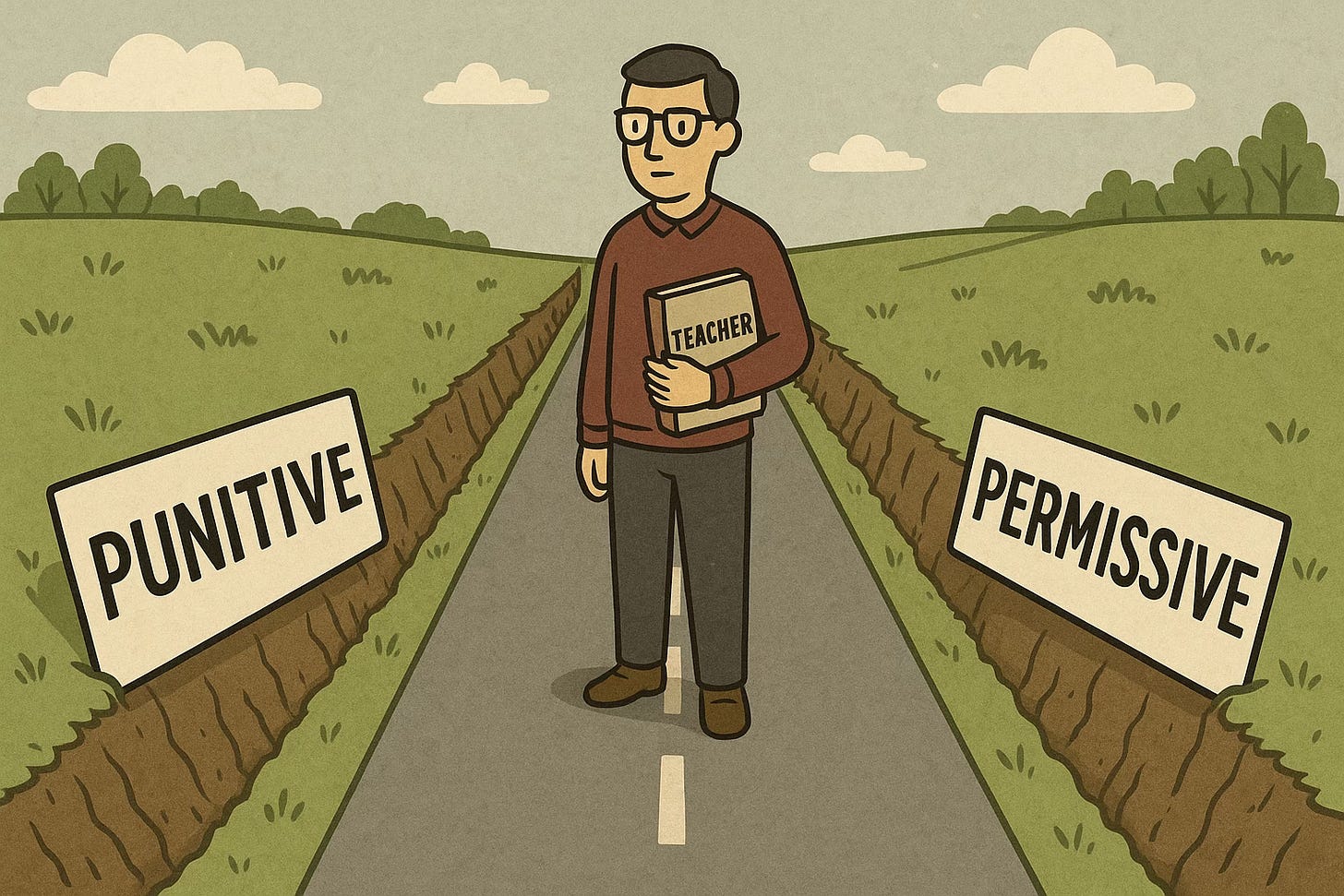Good afternoon, dear reader.
I’m coming to you from an inexplicably packed coffeehouse in Bloomington, IN where we’re in town for a good friend’s wedding. I’ve been meaning to type this up for some time now, and have kept making excuses not to - but here we are.
Back in November I wrote a post for the Baylor Center for School Leadership’s blog to be posted this spring. The title: “The Power of Fist-Bump Diplomacy” (you can read it here).
The gist of the piece is that I discovered (somewhat accidentally) in my second year of teaching that using fist-bumps to pre-empt and conclude each interaction with students (walking in to class, after a correction conversation, meeting to revise an essay, etc) is a helpful tool in building relationships with students and communicating that they are seen, known, and that I am glad they are here. It’s become a “thing,” I’m the guy who gives out fist-bumps. As I stand in the hall during passing periods, it’s pretty common that random students who I don’t have in class will offer up their fists as they pass by. I probably give or receive 200-300 fist-bumps a day. It’s become second-nature to both parties.
The great irony is that around the time this article went live, I was frustrated because my relationships with students seemed to be at a year-long low. It was the time of year when we were stuck in the liminal phase between beginning-of-year excitement and end-of-year hopefulness: the dreaded late-February / mid-march doldrums. Teachers were tired, students were cranky. Increasingly creative methods to get around the uniform code were being developed by the hour. Homework completion levels were low. If you’re a teacher, you know how this goes. And so I found myself giving out lots of infractions.
Infractions are the discipline-referral system that we use to keep track of behavioral situations and communicate between teacher, dean, and parent. It’s a glorified Google Form, and if a student is, say, out of uniform, a teacher writes up the infraction (where it is stored in a spreadsheet for the dean), and then forwards the form to the student and their parent.
It primarily exists as a data-gathering and documentation tool; if a parent is brought in for a conference, infraction data can be used to inform those conversations: “Well, this behavior isn’t new. It appears that Mrs. Jones wrote little Timmy an infraction back in November for calling his classmate a ‘stupid-ass bitch.’” I knew I was writing a lot of them - I found myself in a position of being the uniform-enforcer of the hallway, and would make a mental note of infractions to write later in my free time.
Our administration was concerned that teachers were getting lax in recording this data, and pulled up the spreadsheet. Lo and behold, your humble correspondent had written more infractions over the course of the year than any of my colleagues. That’s right. We’re talking triple digits.
Why writing hundreds of infractions is a problem
Seeing that stat gave me pause. I realized that, in my zeal to have orderly hallways, an orderly classroom, and orderly routines, I had become like Fred Armisen’s character Raul in Parks and Rec:
This is outrageous. Where are the armed men who come in to take the protestors away? Where are they? This kind of behavior is never tolerated in Baraqua. You shout like that they put you in jail. Right away. No trial, no nothing. Journalists, we have a special jail for journalists. You are stealing: right to jail. You are playing music too loud: right to jail, right away. Driving too fast: jail. Slow: jail. You are charging too high prices for sweaters, glasses: you right to jail. You undercook fish? Believe it or not, jail. You overcook chicken, also jail. Undercook, overcook. You make an appointment with the dentist and you don't show up, believe it or not, jail, right away. We have the best patients in the world because of jail.
“We have the best patients students in the world because of jail infractions.” That had become my mentality. In my experience, teachers tend to fall into one of two ditches when they are in places of stress or unhealth. One ditch is becoming overly permissive, while the other is becoming overly punitive. Though finding a perfect Aristotelian golden mean is the key to healthy classroom culture, my tendency is to fall into the latter of the two when I am tired, stressed, or worn down.
I was writing infractions for everything, and often wouldn’t give warnings or a head’s up before meting them out from on high. Oftentimes, the first time a student experienced corrective action was when they saw the infraction sitting in their inbox, with their parents and the dean CC’d.
This was something of a light-bulb moment. As soon as I realized this, I started to notice the ways students were interacting with me. Resentment rather than respect, gloom rather than joy. I was making it rain infractions rather than focusing on building rapport and making lasting change.
A bajillion slaps on the wrist don’t actually drive behavior change. They lead the “corrector” to assume bad intentions, disrespect, or malign character. That’s where my head was at while interacting with my students, and as you could imagine, my days were long and my mood was sour. I kept telling myself that doing the quick wrist-slap took less effort than having a conversation, but in reality it created more problems for me down the road.
To change this, I created a challenge for myself: don’t write any infractions for a week.
Simple. I wanted to focus on relationship building by having one-on-one corrective conversations with students instead of going to war with them over small potatoes.
The crazy thing? It worked. Like, instantly. Instead of making a mental note to write an infraction later for the tie-less, untucked-shirt-wearing, coat-donning kid passing me in the hallway, I instead focused on taking the time to show the student how to tie his tie, telling him he looked sharp after he tucked his shirt in, and offering to keep his coat in my classroom so he wouldn't be tempted to wear it around the building. My colleagues at Valor Christian high school in Colorado call these “Speak Life Conversations,” because the heart behind them is to speak life into the student as they are being redirected to more positive behavior or character.
That’s the kind of interaction that builds rapport rather than eroding it. Multiply that by 7-8 times and add in 200 fist bumps a day, and within a week relationships with my students had almost completely turned around. And guess what? I was happier. I had more fun in the classroom. My students were more engaged.
The Broader Implications for Relationship Building
I’m a huge fan of David I. Smith’s writing. He’s a teacher who is passionate about helping Christian educators think about what it means to teach Christianly. The idea here is that there is something distinctive about a Christian educator that can make them effective in any context - being a teacher and Christ-follower isn’t limited to praying before class or tying a Bible verse into the lesson. Christ’s grace and mercy should be baked into the pedagogy itself - small things like knowing students’ names (and using them), designing lessons that aim for human flourishing, and exercising grace in disciplinary interactions are all critical elements of being a Christian teacher.
Obviously, one does not need to be a Christian to do any of these things, but it’s worth noting that the only reason this is a generally accepted ethic in the west is because of the influence of the Gospel.
One way to conceptualize this is as three “core competencies” of Christian educators: Feedback, Relationship, and Humility.
At the intersection of these three circles is Love. A deeply Christ-like love that seeks the good of the other over one’s own comfort or desires. When I was writing infraction after infraction each day, I was short-changing formative feedback. I was neglecting humility by making it about my own offense at their behavior. And I was chipping away at relationships by stacking up poor interactions.
This created an atmosphere in my classroom characterized by “sit down, shut up, do your work” rather than “I see you, I know you, I’m glad you’re here.” Speaking life into my students, rather than sucking it out of them, has become my new strategy.
I was probably averaging 30-40 infractions a week before this shift. I’m now down closer to 5, only writing infractions for the most egregious incidents or when students ignore our conversations.
To be clear, none of this requires lowering expectations for quality of work, behavior, or character. It simply requires an adjustment in the method of redirection.






Did your change in infraction writing cause issues with administration?